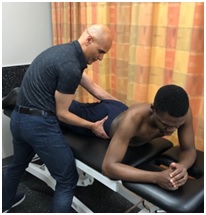A person hurts their back, waits a couple of days and then decides to go to see their family doctor. They are most likely prescribed NSAIDs and then either referred to PT or told to wait a few weeks. After a few weeks if they are not better, they are sent for an x-ray and prescribed another course of NSAIDs. Even after 3 months they may be among the 93% of patients with LBP who are not referred to PT by their MD.
Although there is significant geographic variability, this retrospective study involving over 32,000 patients, showed that on average only 7% of patients were referred to PT for their acute LBP.
Of the 7% who received PT, 53% received PT within 2 weeks of their LBP diagnosis (early PT) and 47% received PT between 15-90 days (delayed PT)
Q: Is it beneficial if the patient is referred to PT within the first 2 weeks of injury? Or should the MD wait a couple of months before referring?
A: Those who received early PT, were
Less likely to have advanced imaging
Less likely to have injections
Less likely to have surgery
Less likely to use narcotic medications
Fewer doctor visits
Lower overall health care costs (approx. $2700 ea.)
Furthermore …
The patients who received PT focused on providing independent exercises and self-management programs had on average $1400 lower health care costs when compared to those whose PT involved passive modalities such as ice, heat or usltrasound.
 Based on this paper published in Spine, it appears that if referral to PT is to be made, delaying PT may increase risk for additional health care usage and costs.
Based on this paper published in Spine, it appears that if referral to PT is to be made, delaying PT may increase risk for additional health care usage and costs.

